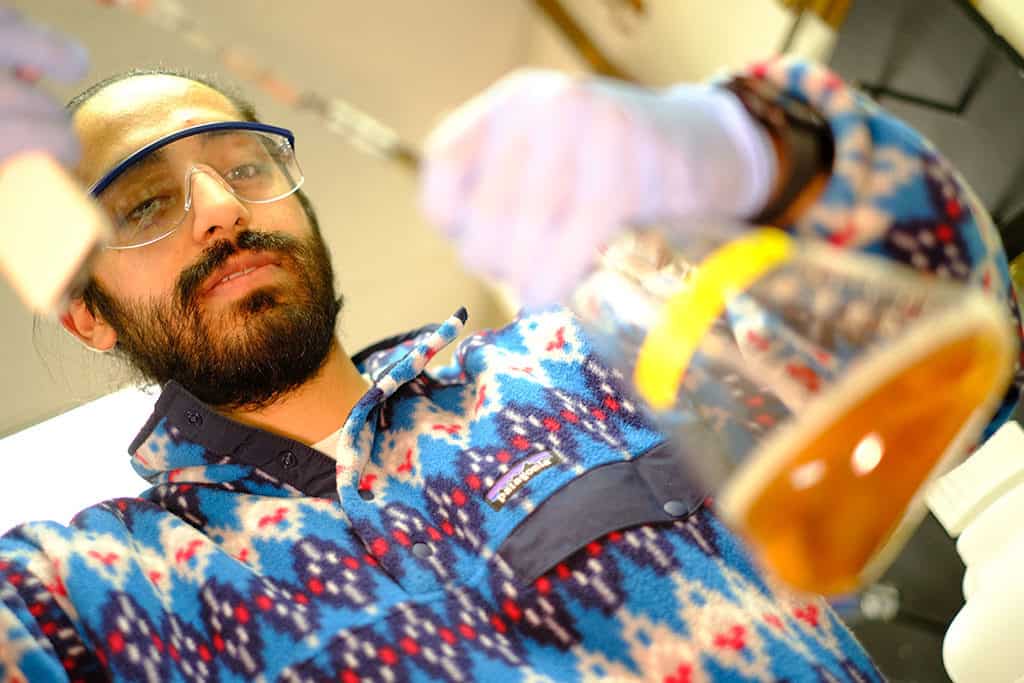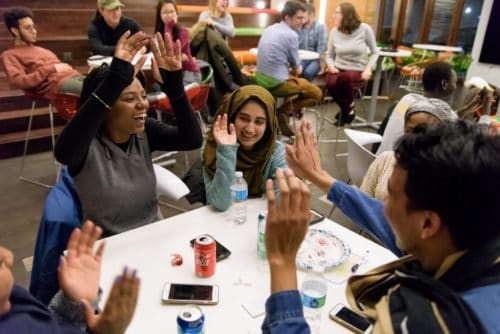Cultivating the Future
Rahuljeet (RJ) Chadha ’20 is a chemistry major and French minor from New Delhi, India. Research plays a central role in Chadha’s academic work as a chemistry student at Trinity. Here he reflects on his time in the lab with a professor and fellow students and on recent accolades he received for his research.
When I was in high school, I had the opportunity to do scientific research projects on dementia and the quantification of caffeine in coffee beans and tea leaves. Through these projects, I developed a strong interest in doing research, which I wanted to continue during my college career. When I arrived at Trinity, I began looking for opportunities to engage in research that would interest me and help me grow as a student. Very early during my first year, I reached out to several professors in the Chemistry Department whose work interested me. I was particularly excited by Assistant Professor of Chemistry Michelle Kovarik’s research. In her lab, students were working with an organism known as Dictyostelium discoideum (social amoeba), known as dicty cells. Dicty cells are interesting because they have an unusual life cycle. They exist as unicellular organisms, but after consuming all the bacteria in their area, they proceed to stream together to form a multicellular organism. After meeting with Professor Kovarik and getting to know more about her project, I knew her lab and research were the right fit for me. I started working in Professor Kovarik’s lab in the summer of 2017.

In our research, we used three well-known methods of loading: electroporation, myristoylation, and pinocytosis to load peptide substrate reporters in intact cells of Dictyostelium discoideum. Our enzyme of interest was Protein Kinase B, which is a crucial enzyme responsible for various cell processes such as cell metabolism, motility, cell cycle, and apoptosis. This project helped us to compare the three loading methods and see how each method affected the metabolism of foreign molecules that we were trying to load in the cells.
Our research team recently had the results of our work published in Analytical Chemistry, which is a journal of the American Chemical Society and one of the most prestigious journals in the field of analytical chemistry. Additionally, in November 2018, I—along with other students who work in Professor Kovarik’s lab—had the opportunity to present our research at the 2018 American Society for Biochemistry and Molecular Biology Northeast Regional Meeting at Northeastern University in Boston. My research poster won one of three awards for best undergraduate poster. The award included a stipend toward attendance at the 2019 American Society for Biochemistry and Molecular Biology Annual Meeting in Orlando, Florida.
Professor Kovarik is an amazing mentor and working with her has been the most rewarding experience of my undergraduate career so far. I have gained tremendous insight and knowledge about working in a lab. In addition to strengthening my laboratory skills, it has given me the opportunity to use cutting-edge technology and other advanced lab instruments. Through research, I have also been able to strengthen my analytical and problem-solving skills. These experiences have proven to be very edifying for me as a student.
To students interested in doing scientific research: I would highly recommend pursuing research opportunities, especially if you are thinking of going to graduate or medical school. This will not only strengthen your application for post-graduate work, but it will help you gain transferable skills that can be applied to a variety of fields, not just those that involve work in a research lab.
This summer, I plan to work in a pharmaceutical company where I can apply my knowledge and skills in an industrial setting. When I am back on campus for my senior year, I will continue to work in Professor Kovarik’s lab; currently I am investigating the specificity of the peptide substrate reporters of dicty cells.

